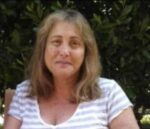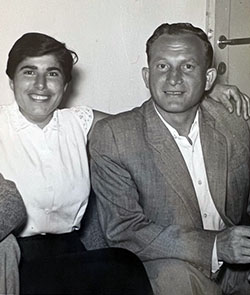By Shuli Hanover

ALPINE, California — My father was born in 1920 in Poland in a small town by the name of Otwock, about 23 kilometers southeast of Warsaw. The town has been known for its thermal bath and recreation facilities. His father, Chaim David, and mother, Rivkah, had a general store which was situated in the middle of town. The family busily served the citizens of Otwock and my grandpa tried to keep them happy whenever they needed anything. There were times when drunk thugs used to come into the store and demand free booze and food.
The family lived above the store. My grandparents had six children: Hava, Malkah, Moshe, Roman, Dov (who was my father) and Mania. The Jewish community was established and felt relatively safe living in this little, lush green town.
My father graduated high school like all his older brothers and sisters and was preparing to assist in the family business.
In 1939, when the winds of war started to blow in Europe, my father, age 19, and five of his friends realized that something really bad was about to happen. They couldn’t figure it out. They decided to flee their little town, cross the border to Russia and wait.
After a short period, they were declared prisoners and were sent to a Gulag – Forced labor camp — in the tundra of Siberia. In this part of the world, in the winter, the temperatures descend to 40 below. The prisoners received a cup of murky water as tea or soup and one slice of bread for the whole day. Many didn’t survive the difficult living conditions. Every morning, the ones who survived had to go outside and clear the dead bodies from the snow. There was no way out.
There was also no way to learn what was going on with the families who were left behind in Poland.
After almost three years in the awful camps in Russia, my father and three of his friends managed to escape and joined the Russian military. Shortly after, they crossed the border back to Poland, speaking fluent Russian and trying to go back to Otwock.
It was in August 1942 when my dad, walking carefully in the empty streets of Otwock, found two red boots by the house he grew up in. Those boots were his sister Mania’s. He knew, right then and there, that those boots were the only items that he would find of his once-known and beloved Hanover family. In those dark moments, he felt as if he had no soul – as his family had left the world.
My father and his friends, who managed to stay together, learned that the Nazis had come to town, gathered all the Jews, walked them to the nearest forest and screamed at them to start digging. After the hole in the ground was large and deep enough, over 2,000 men, and women — young and old, children and babies — were shot to death and their lifeless bodies were kicked into the hole. The ones who didn’t die had to cover the hole with the excess soil and upon finishing, were shot as well. They didn’t get the ‘respect’ of being buried.
My father decided to keep going, to stay alive. He joined the Polish army and moved with a unit to North Africa. The service in the Polish army was short-lived. He deserted the Polish army. This was a desperate act. If you desert from the military during a war and are caught, it’ll be the end of your life by a firing squad. He had to change his name and his date of birth and after wandering for a while, was found by a British officer, who recruited him to the British Army. He became an auto mechanic and traveled to many places, where they needed his expertise, including India, Italy, Egypt and Algeria.
There is one story that brings tears to my eyes every time I remember it. A story about how proud my father was of his Jewish inheritance. He served in Algeria and found out that the evening he got ‘off duty’ was Leil Ha’Seder (First night of Passover). He searched for a synagogue because he wanted to celebrate Pesach. He found the local rabbi’s home and knocked on the door. The rabbi opened the door and started to ask him questions. The rabbi was concerned that this soldier was not telling the truth and that the community would be harmed. My father didn’t know how to convince the rabbi that he was Jewish. He asked the rabbi to bring him a siddur. He started to sing the shema.
In 1946, he made his first visit to Israel. The officer who found him and became his friend offered to my father the opportunity to move to England with him and build his life there. You probably know what my father answered.
In 1948, just before the British Mandate ended, my beloved father came to Israel and declared: “This is my country and I am here to stay.” He joined the Haganah and fought during The “War of Independence.”

In 1950, while in Kibbutz Menara, my father spotted a young woman who was dancing with her friends at the end of a work day. He and Esther met, fell in love, and were married in Tel Aviv on May 25, 1952. Can you imagine, an Ashkenazi blonde/blue-eyed marrying an olive skin, dark brown-eyed, and jet-black hair -Sephardic woman? My mom’s family, ten sisters, and brothers, adopted my father, and together, my parents built their lives in Israel which was young and in deep recession.
My mother, who was born in Jerusalem, was of the fourth generation of Jews who came from Aleppo in Syria. She joined the Golani Brigade and was one of the first hundred women who served in the New Israeli army.
I was born in 1954 and my brother was born in 1956. At the time, my father started to work for the Ministry of Defense and my mom was a homemaker.
My father made many attempts to find family members. He discovered the brother of Mania’s husband, and the two families became very close. Yet, growing up in Israel was never really easy, especially during so many wars, when my dad, who worked for the Ministry of Defense used to disappear for months, for all kinds of operations.
He also was a Holocaust survivor who never spoke about the horror of those days. The sadness in his eyes and some awkward behaviors were signs of how he suffered inside and didn’t want to burden us. He also found, in Israel, and the USA, three of the friends who, together, escaped death by crossing the border to Russia in 1939. They talked a lot among themselves in Polish, Yiddish, and Russian but never when the children were around.
The fridge in my house in Israel was always full of food to the point that when you opened the door, food was falling out. My house was always open to anyone hungry, tired, or in need of a shower. Nothing was ever old or thrown in the trash. If it was an old chair that had broken, my father would find a way to repair it, paint it, and make it usable again.
I asked my dad many times to go to Poland with me to search for information or the house he used to live in. His decisive answer was: “I cannot step on the ground that is soaked with my brothers’ blood”
When my son, Nathan–may he live healthy and happy–was born, my father and mother came to visit the miracle. The dam was breached. My father started to talk about his family and the horrid time in our history.
In August 2012 I visited Poland. I stayed for one week in a lodge in Otwock with a group of second-generation Holocaust survivors. I dedicated time to finding documents/certificates of birth, marriage, and such at the municipal office in the city, and discovered records of my entire family. They were in heavy, large books, hand-written descriptions of dates and places with those “never to be forgotten” names of my aunts and uncles, cousins and grandparents.
I was so thankful to revive the memory of these family members, even if only by seeing the names written. Saying their names was like having a service for their souls whom I pray G-d has been given a peaceful rest.
On the 19th of August, we all attended a memorial on the 70th anniversary of the massacre of the Jewish people in Otwock. The memorial took place by the forest where the killing occurred. Kaddish and El Maleh Rachamim were said in three languages. It was a beautiful service. Part of the circle – for me, was closed. The second week of my visit was dedicated to a visit to two connected concentration camps – Auschwitz and Birkenau.
We had a young woman from Germany as a guide. She was very knowledgeable. And, the descriptions of how the trains used to arrive at the camps with the people ‘stuffed’ in them “like sheep to the slaughter, were said coldly and distantly. Yes, the damage to humanity from 80 years ago, will not fade that quickly…
The second half of the circle was now almost entirely closed.
Sadly, after visiting the camps I can say: I will never be the same person again.
In an ocean of silence
The walk to the camp
Seems unreal
And my feet are so tired
So heavy…
My pounding heart
Like drums in a void
That are striking the air
With millions of tears
And the pain…
It is all broken
To the smallest of pieces
Which will never be fixed
And the loss wraps my soul
In the deepest dark red…
There is no “Why” or “How”
Just the puncturing thoughts
gasping for air
And screaming for help
To the end of the world…
*
Shulamit (Shuli) Hanover owns a landscaping business in Alpine and also is a Hebrew-language tutor.
Thank you for sharing your family’s story. It’s another beautiful example of the courage and will of our proud people. I’m so grateful that your father, as a teen, realized the danger of what was imminent and took off for Russia. It’s incredible that he made it to Israel, and even more amazing that he and your mom continued to create family and teach Yiddishkeit.
Yasher Koach! Thanks again for keeping this tragedy, and success, in our memory.
Our mother Stella (1921-2018) and her twin brother Lazar Sławin (1921-194?) whose parents Szaja & Ala owned the lending library Czytelnia Współczesna across from the railroad station (the other side of the tracks from your father’s family) were raised in Otwock interbellum. Our grandparents were murdered in the Aktion of August 1942 you describe. I welcome being in touch, Shuli.
Shalom Martha

I would like it very much.
Am not sure if it’s a good idea to leave my info here.
If you have a FB account, you can find me and leave a pm on messenger.
Hope to hear from you soon
Shuli